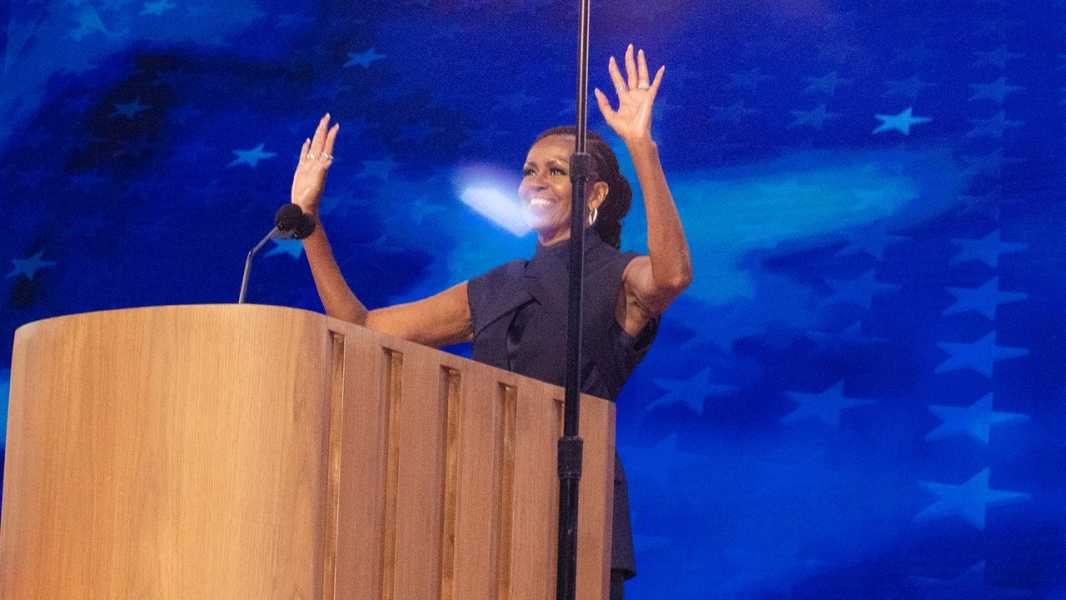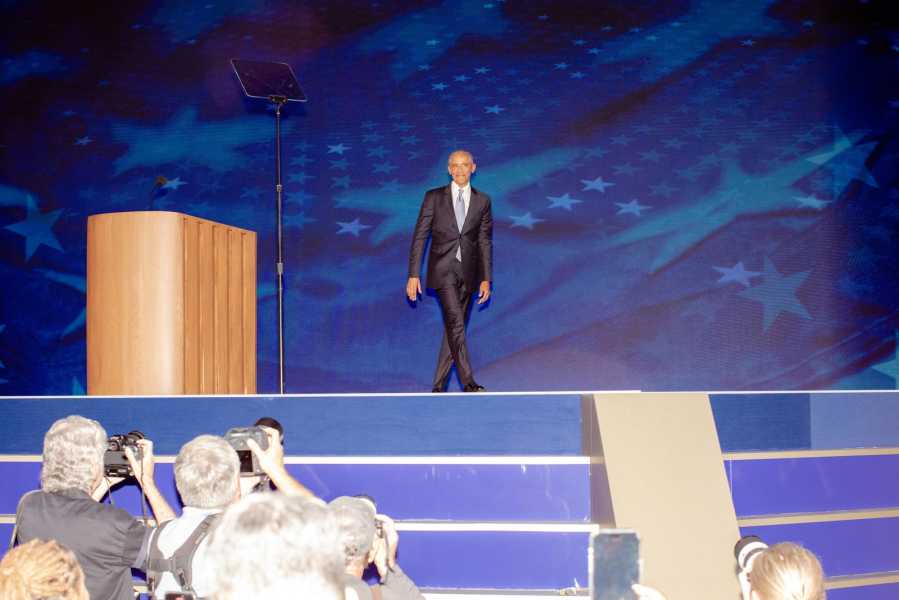
Save this storySave this storySave this storySave this story
So much recent history comes rushing to mind when an Obama, husband or wife, shows up at a Democratic Convention. Most of us first heard of Barack when, as a young Senate candidate from Illinois, he showed up at the 2004 Convention. John Kerry lost to the incumbent President, George W. Bush, a few months later; the most resonant surviving image of that night in Boston is of the talented Black newcomer, softening America’s warring cultural archetypes in search of a new synthesis. He spoke of how “we coach Little League in the blue states and yes, we’ve got some gay friends in the red states,” of how “we worship an awesome God in the blue states, and we don’t like federal agents poking around in our libraries in the red states.” No American, he argued—before the broad public had had a proper chance to take his measure—was totally legible by the evidence of his address. We would come, soon enough, to recognize this impulse to smooth out apparent contradictions as his most reliable habit of mind.
Twelve years later, in 2016, Barack had won not only a seat in the Senate but, startlingly quickly, also the big desk at the White House, for two eventful terms. Now the task was to step nobly away from the spotlight he’d first attracted in ’04 and make the case for Hillary Clinton, Obama’s preferred successor, against Donald Trump. Perhaps the most memorable moment from that Convention came when Michelle Obama, dignified and didactic, instructed the crowd that “when they go low, we go high.” They being Trump and his supporters, then calling lustily, at practically every televised opportunity, for Clinton to be arrested and put in jail. If Barack liked to play the conciliator, unveiling heretofore unperceived dimensions of sameness among disparate peoples, Michelle often played the patient teacher, offering instruction from a benevolent distance, then retreating, until next class period, into privacy. From the beginning of the couple’s public life, she was reported not to enjoy politics or particularly admire its practitioners. Maybe she felt that the professionals who kept their clever noses in the news cycle’s trough didn’t step back often enough to breathe the air of real wisdom. From time to time, she’d drop by and share hers. People started repeating her high-road mantra shortly after the speech, and they haven’t really stopped since.
That these marquee performances both came in years when Democrats went on to lose Presidential elections points to a lasting tension between the Obamas and their party. They have been restrained in parlaying their own esteem on behalf of admittedly less thrilling national and local Party apparatus. Under the Obama Presidency, the Democrats lost catastrophic numbers of state houses and seats in local legislatures, a woeful fact often attributed to the President’s disinterest in the unsuave role of Party boss.
On Tuesday, the second night of this year’s Democratic National Convention, when the Obamas were the much awaited headline speakers, their party’s barely manageable pluralism was on particularly exuberant display. Early in the evening, the singer Patti LaBelle, in black and white and swooping hair, was called on to sing her song “You Are My Friend,” as a tribute to recently deceased allies played on a huge screen. As the names scrolled past, you could see how a “big tent” might get stretched past coherence. One display had, in uncomfortably close proximity, the names of Colin Powell—Bush’s Secretary of State and one of the foremost faces of the Iraq War’s onset—and bell hooks, the brilliant scholar, teacher, and critic who decried America’s “cultures of war.” The grandsons of Jimmy Carter and John F. Kennedy both spoke, offering the imprimatur of their families to the cause of Vice-President Kamala Harris. During the roll-call vote to pledge delegates for Harris, DJ Cassidy played a long set, corny but fun, with at least one site-specific song for each state. (New York seems to be stuck, at least for now, with Jay-Z’s regrettable “Empire State of Mind.”) When Georgia’s turn came, the rapper Lil Jon appeared and performed, at surprising length, his when-millennials-were-young hit “Turn Down for What.”
After a long Monday night, the Convention’s producers were supposed to be worried about time. But they couldn’t help the big display—the Democrats are a messy, tacky, patchwork party, a quilt of constituencies and factions, all insistent on self-expression. To articulate its outlines sufficiently is, almost by definition, to spill past time, to run counter to the withholding, parsimonious control that has characterized the Obamas all along.
When Michelle came onstage, it was already quite late. She started out by talking about “a familiar feeling that’s been buried too deep for far too long. . . . Hope is making a comeback!” It worked as a callback to a word that had defined her husband’s political era. But it was somewhat awkward, too. After all, a Democrat, Joe Biden, has been in the White House for almost four years now. Harris, the new nominee, lives in the Vice-Presidential residence and has an office in the West Wing. If hope went away after the Obamas left town, and is slinking back only now . . . what does that mean? It’s true that the Biden Presidency has not been fuelled by personal charisma in the way that Obama’s was. Biden’s impressive legislative record has depended, instead, on a deep knowledge of the legislative branch’s inner workings, an ardent attempt at intraparty coalition building—Biden has thrown more carrots to his left than Obama ever did—and a society-wide rethinking, post pandemic, of what a government ought to do on behalf of its citizens. Maybe that’s a good thing. Maybe Biden’s term has taught us that change is more often a product of hard structural work than of personal flash.
Michelle went on. She speaks deliberately and without patent hurry, always at great pains, in her writing and in her delivery, to get across a simple message. This time, it was about mothers and the long shadow of influence that they cast. Her own mother died in May, and much of the early part of the speech was to show how this Chicagoan lady was much like Shyamala Gopalan, Kamala’s mother, who told her time and again not to simply complain but to act. Both daughters, Michelle and Kamala, knew, because of how they were parented, that they’d never (like, say, Trump) be able to depend on “the affirmative action of generational wealth” or any of the other advantages of growing up heedless and rich.
Part of the Obamas’ job here, it became quickly obvious, was to go on the attack against Trump, who is famously easily triggered by these two. Michelle wasn’t afraid to approach that job from the vantage of race: “His limited, narrow view of the world made him feel threatened by the existence of two hardworking, highly educated, successful people who happen to be Black,” she said. Few others could carry a tough, true message like this and still seem calm, temperate, almost sweet. And, again, she had a set of instructions: “Michelle Obama is asking you—no, I’m telling y’all—to do something.” She wanted the crowd to keep the faith, to work hard, to hold on to that sense of hope even when times get tough. You might disagree with the ticket; they might make a real mistake—but hold your peace until the race is won. There’s something practical about that idea, but it also reflects another classic Obama tension, between mainstream power and the moral weight of righteous protest. Outside the walls of the festive Convention, there are protesters decrying the role of Biden’s Administration in supplying arms for the tragic, lavishly violent war still ongoing in Gaza. The Obamas have tended to equate the rough-hewn aesthetics of outside protest with political immaturity—the right thing to do is fall in line now, get the job done, and parse your differences later on. Increasingly, the answer from the young and morally engaged is ‘No, thank you.’
Michelle’s speech was heartfelt, complex, as interesting to read afterward as it was to watch in the moment. She had spoken—not just rallied but taken both the time and the right tone to get a thought across. She’s good at this, better than any Democrat still working, including Kamala Harris, on whose behalf she was speaking. When Michelle introduced her husband, to the audible excitement of the crowd, I’d bet that most honest listeners at home would have been content to call it a night.

But Barack came bounding in anyway, waving to the crowd as the strains of a U2 song played. He loves to walk in to U2; he’s been doing it for years now. Like him, they’re an arena act with heart, with a name that has come to be instantly associated with having a humanistic good time. And, like U2, he’s not ashamed to repurpose his old hits for a contemporary crowd. “I’m feeling fired up!” he said, knowing the crowd would catch the reference to his old stump speech from the ’08 campaign. “I am feeling ready to go, even if I am the only person stupid enough to speak after Michelle Obama.” He took a moment to sing the praises of Biden, his old V.P.—everybody in the building had likely heard that relations between the two men were, lately, not for the first time, somewhat sore. Obama had sided with Nancy Pelosi in the awkward business of nudging Biden aside. Now, though, Obama played up Biden’s patriotism. He’d done the right thing.
Obama made a detailed (and slightly lengthy) case, policy by policy, for the new nominee, who, like him, has a “funny name”—yet another old campaign reference, and an acknowledgement, to boot, that Harris’s campaign might be as so-called “historic,” in terms of identity, as his own. Then he eased into a bit of cultural criticism. “We live in a time of such confusion and rancor, with a culture that puts a premium on things that don’t last—money, fame, status, likes.” He said the word “likes” with an especially emphatic disdain. The man who ran the first truly social-media-boosted campaign still instinctively hates the Internet:
We chase the approval of strangers on our phones; we build all manner of walls and fences around ourselves and then we wonder why we feel so alone. We don’t trust each other as much because we don’t take the time to know each other—and in that space between us, politicians and algorithms teach us to caricature each other and troll each other and fear each other.
Obama’s not above a bit of trolling: just a few minutes earlier, he’d made a visual joke about Trump’s obsession with crowd size. After uttering the word “size,” he made a measuring motion with his two open hands, bringing them from big to small, as if shrinking a . . . well, an item of great psychic importance. Still, his bit of cultural-technological diagnosis touched on an anxiety that goes beyond the strict boundaries of electoral politics. Much of the frank—so far, largely contentless—excitement for Harris proceeds from fears like those Obama articulated. It’s hard to think that something won’t break permanently if Trump’s given another chance to trample our “bonds of affection”—that Lincolnian phrase that Obama just won’t quit—for four more dark years.
Barack’s speech wasn’t as tightly focussed or as acutely moving as Michelle’s, but his understanding of his audience—the audience of regular voters at home, if not the Party cheerleaders right in front of him—is a power that hasn’t faded. For better and for worse, the Obamas are still the best communicators that the Democrats have. They’ve been off to the side for a while, making TV shows and selling books. One wonders, now, whether their continued appeal—they speak in a special key to even the most hardened millennial-political ears—will work, in a lasting way, for somebody else. ♦
Sourse: newyorker.com






